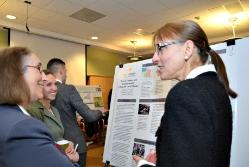"Around the College" is no longer being updated.
View current SUNY Empire Stories.
March 9, 2017
Graduate Students’ Work Selected for SUNY Faculty Senate Graduate and Research Conference

The research of SUNY Empire State College School for Graduate Studies students Kristina Kwacz, Hiroko Miyashita, and a collaborative project by Eleanor Levin, Carolyn Massey and Lori Mould, was selected for the University Faculty Senate of SUNY’s 2017 conference “Graduate Research Today and Tomorrow,” held Tuesday, March 7, at SUNY Empire State College’s location at 113 West Avenue, Saratoga Springs, N.Y.
More than 50 Students, and their faculty advisors, from 18 SUNY campuses participated in the one-day conference.
SUNY Empire President Merodie A. Hancock and UFS President Peter Knuepfer welcomed students and faculty. SUNY Vice Chancellor for Research and Economic Development Grace Wang and the Research Foundation for SUNY President Jeff Cheek provided keynote remarks.
Master’s and doctoral candidates presented on a broad array of research topics including chemistry, biology, sociology, psychology, economics and others.
“In order to support and fulfill SUNY’s mission as a public system of higher education, it is important to provide our graduate students with a quality education, which includes providing for research opportunities,” said SUNY Empire State College School for Graduate Studies Interim Associate Dean Rosalyn Rufer, who chairs the Faculty Senate Graduate and Research Committee. “Studies demonstrate that learning takes place through both convergent and divergent thinking. Thus, just performing research is not sufficient, it must be shared, discussed and then refined.”
Sylwia Starnawska, an assistant professor with colleges’ MBA faculty, and Christine Paige, lead instructional designer for the college’s School for Graduate Studies, also serve on the graduate and research committee and worked to organize and run the event.
About Kristina Kwacz
Kristina Kwacz, a student in the college’s Master of Arts in Liberal Studies (MALS) program, explored Joseph Stalin’s reign of terror throughout the “Kresy” (Poland’s Eastern boarders during WWII) in “Terror, Trauma and Totalitarianism: Lifting the Veil of Silence” and considered factors that contributed to the West’s diminished awareness of events targeting ethnic Poles. Among these are the Stalinist regime’s control of media and use of propaganda to convey Soviet superiority and infallibility.
Kwacz’s research paper, “Pilgrimage, Partitions, and Patriarchy: Polish Women and the Virgin Mary,” also was recently published in Confluence, The Journal of Graduate Liberal Studies.
About Eleanor Levin, Carolyn Massey ‘12 and Lori Mould ‘14
“SUNY Empire State College had three students researching the role of media in politics,” said Rufer. “Their research in this area may lead them to jobs in either the media, public relations, or politics. Increasing the visibility of the students’ research, will hopefully open the door to a job that they love.”
Carolyn Massey ‘12, currently enrolled in the college’s Master of Arts in Liberal Studies program, completed a B.S. in Community and Human Services, Eleanor Levin, an MBA student, and Lori Mould ’14, a past SUNY student trustee and recipient of the Chancellor’s Award for Student Excellence, who earned her B.A. in The Arts, with a concentration in photojournalism and documentary production, and is scheduled to complete her Master of Arts in Adult Learning, with an advanced graduate certificate in veterans’ services this spring, presented “Truth or Consequences, Fact vs. Fiction: The Internet, Social Media and the American Public.”
These three graduate students researched communication during the early part of the 20th century.
Specifically, then President Franklin D. Roosevelt conversations with the nation – “fire-side chats” broadcast by via radio – with the where he quelled rumors, pursued trust, and explained policies by communicating directly with the public.
During the 2016 presidential election, candidates reached out directly to the public via the internet and social media.
Masse, Levin and Mould also researched “Fake news,” also known as pseudo-news, and false news, which was once characterized as “Muckraking,” and is not entirely new.
Tweets, blog and social media posts – instantly available on desktop computers, tablets and smartphones – have replaced scheduled radio and TV broadcasts.
These three SUNY Empire graduate students explored possible answers to questions such as: “How much of this information is truthful and accurate?” and “Who and what do we believe and why?”
About Hiroko Miyashita
Hiroko Miyashita, studying to complete her Master of Arts in Liberal Studies, explores the rising in popularity in the U.S. of Japanese manga (comics) and anime (Japanese-style animations) in her paper “The Appeal of Manga and Anime for Japanese Language Learners.”
U.S. students' primary motivation for learning Japanese comes from their interest in Japanese pop culture such as manga and anime.
Miyashita cites the Japan Foundation as the source for this national motivation and she explores the impact of Japanese manga and anime fandom on perceptions of foreign language and culture learning within a Japanese pedagogy context.
Her research seeks to answer questions surrounding this phenomena including: “Why are Japanese manga and anime so popular in the U.S.?”
